2021 China-Europe Investment & Legal Leaders Forum
On May 9, 2021, the Sino-European Investment and Legal Leaders Forum 2021 was held in Nanshan, Shenzhen, jointly organized by the Swiss-Chinese Law Association and the Shenzhen Bar Association’s Belt and Road and Foreign-related Law Professional Committee. The event was co-organized by KKG Law Firm, Chigbu Global Tax Planning, Ruggle Partner, and Xunmei Science and Technology Plaza. About 150 renowned lawyers from Beijing, Shanghai, Guangzhou, Shenzhen, Wuhan, Xiamen, and Sichuan, Hunan, Zhejiang, and other parts of China and senior executives of large enterprises in various industries, as well as relevant government agencies and arbitration institutions in Guangdong, Hong Kong, and Macau Greater Bay Area, attended the event and participated in the forum.
The forum examined the future of the China-EU Comprehensive Investment Agreement from the perspectives of China and foreign countries, government investment departments, arbitration institutions, business managers, and professional lawyers in a comprehensive and multi-dimensional manner. It allows ideas to circulate, changing the world with the power of ideas, promoting global legal exchanges and cooperation, realizing interoperability between law and business, and promoting multicultural understanding and tolerance. These are also the values and visions pursued by the Swiss-Chinese Law Association persistently.
Address: Opportunities and Challenges
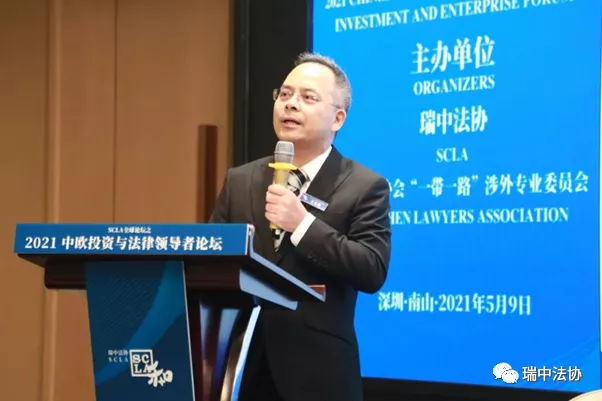
Wang Tianxi, Deputy Director of Guangzhou Arbitration Commission, Dr. Richard Thurston, former General Counsel and Executive Vice President of TSMC, Luo Lifan, Assistant General Counsel of Microsoft, and Gao Tian, Director of Shenzhen Office of Jintancheng Law Firm, opened the forum with their speeches. Mr. Wang Tianxi, Deputy Director of Guangzhou Arbitration Commission, said that it would be meaningful and far-reaching for judicial, legal, and lawyer colleagues from all over China and abroad to gather in Shenzhen, the “outpost” of China’s reform and opening up, to attend the China-EU Investment and Legal Leaders Forum and discuss the new opportunities brought about by the China-EU Investment Agreement from a legal perspective. We would like to congratulate the forum on behalf of the Guangzhou Arbitration Commission. Guangzhou Arbitration Commission is developing Internet arbitration and is the first to launch the world’s first Internet arbitration standard, the “Guangzhou Standard,” and the first to realize Internet arbitration.
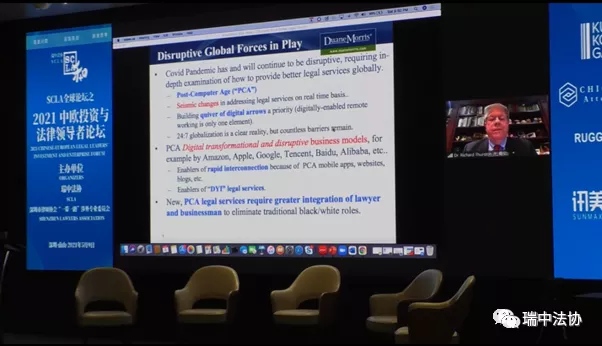
According to former TSMC General Counsel and Senior Vice President Richard Thurston, lawyers in the “post-digital era” should have a spirit of interdisciplinary and cross-jurisdictional cooperation, especially in cross-cultural collaboration, and a comprehensive spirit of cooperation and learning. Furthermore, in the post-epidemic era, the traditional organization of law firms is gradually replaced by global activities such as Internet development. Therefore, in particular, legal services require a more profound integration of lawyers and industry.

Luo Lifan, Assistant General Counsel of Microsoft, discussed his outlook on the CEIBS and the Greater Bay Area from Microsoft’s and China’s telecom industry access policies. Luo Lifan noted that promoting the opening of markets is crucial to today’s globalization. Chinese companies should seek to grow amidst uncertainty. Because “this is the best of times and the worst of times.” In addition, it is crucial to promote the further opening of global markets, and China has made important efforts in promoting international market opening. From the perspective of data security, Luo Lifan pointed out that China’s data protection standards are highly compatible with the GDPR. He expects that the future development of the China-EU Comprehensive Investment Agreement and the Greater Bay Area will bring more openness and breakthroughs in policies for foreign investors to enter cloud computing, telecom value-added services, and interconnection.
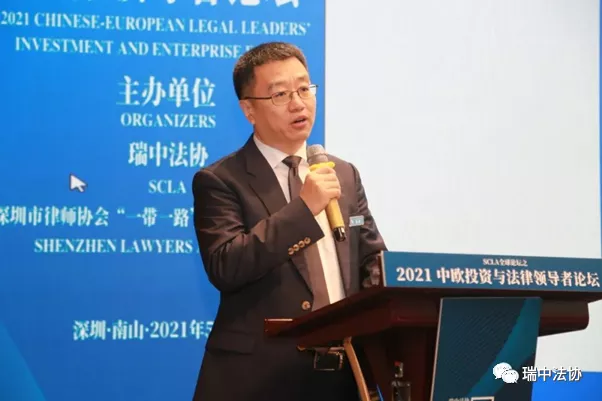
Gao Tian, the Director of JinTianCheng Law Firm (Shenzhen), said that the Swiss-Chinese Law Association (SCLA) had been committed to promoting exchanges and contacts between Chinese, Swiss and Chinese lawyers, scholars, the public sector, and the private sector since 2019. It has made significant contributions to the realization of exchanges and cooperation among legal professionals worldwide and expressed his heartfelt respect for the exchange platform built by SCLA. The current international political and international economic environment is treacherous. The impact of Sino-European investments is facing uncertainty, so this forum is crucial to promote legal and financial exchanges between China and Europe.
The authoritative interpretation of the China-EU Comprehensive Investment Agreement
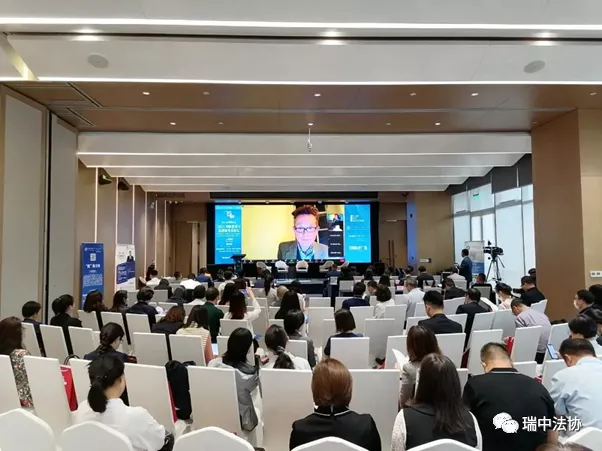
Professor Gunnar Baker, MEP and expert in EU law at the Centre for Asian and African Studies, University of London, confirmed the value of the CEIBS for both China and Europe as one of the most ambitious agreements. He also analyzed four reasons why the EU delayed the ratification process and threatened to stop it. One is the existence of a well-known political background; Two is the solid diplomatic pressure exerted by the US on the EU; Three is that the EU has tied economic issues to moral requirements; and four is the fact that the EU is facing economic difficulties. Yet it cannot live without the huge market of China, especially Germany. Therefore, he is optimistic about the future of the China-EU Comprehensive Investment Agreement.
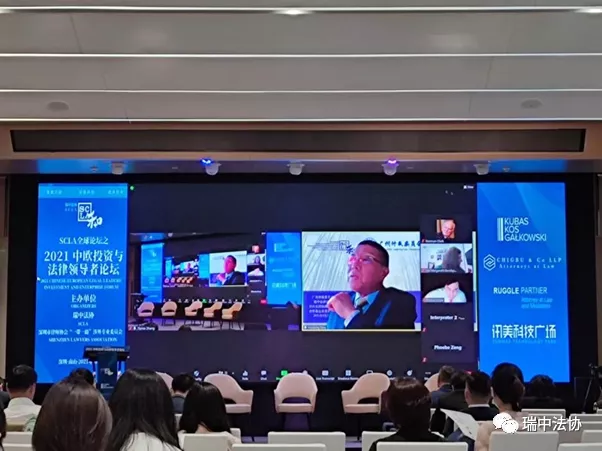
According to Tang Xiaobing, former Senior Counsellor of the World Trade Organization and Director of the Multilateral Affairs Division of the Swiss-Chinese Law Association, the EU’s investment in China is far from sufficient from the point of view the relationship between the multilateral trading system and investment. There is a tendency for Chinese investment in the EU to expand. The agreement will clarify that the conditions for EU companies to enter the Chinese market are not affected by China’s internal policies. It agrees to set up a dispute settlement mechanism within the China-EU Comprehensive Investment Agreement (CAI) to deal with disputes of non-compliance. In addition, after further negotiations, the agreement reached new open commitments, such as the removal of quantitative restrictions, equity caps, and requirements for joint ventures. Therefore, the CAI is also significant for the negotiations of the WTO investment facilitation agreement, containing many topics that affect foreign investment at a deeper level: for example, regulating the behavior of state-owned enterprises, enhancing the transparency of subsidies, rules set for forced technology transfer, as well as commitments on sustainable development, standard setting, labor standards, corporate social responsibility, and other aspects. In his view, the CEIBS is an agreement that the EU is keen to get, and the multilateral investment and trade regime is an unstoppable trend.
Roundtable 1: Insights from the China-EU Comprehensive Investment Agreement and the Construction of the Guangdong-Hong Kong-Macao Greater Bay Area
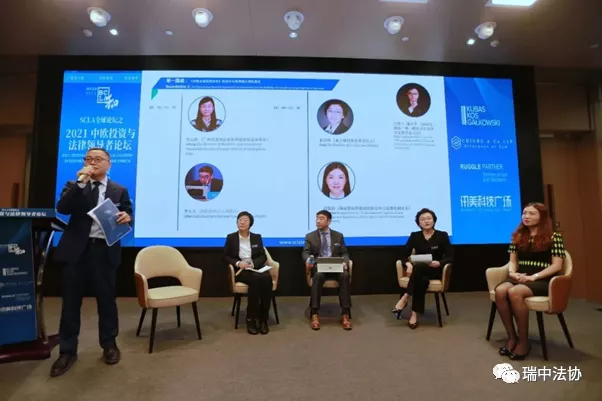
The first roundtable was chaired by Pan Lidong, the Shenzhen Law Association’s Belt and Road and Foreign-related Law Professional Committee. It featured Liu Lifeng, Director of the Bureau of Commerce and Investment Promotion of Liwan District, Guangzhou, Luo Lifan, Assistant General Counsel of Microsoft, Yu Jiaqi, Partner of Tongli Law Firm, and Shao Jinli, Deputy Director of the International Cooperation and Development Division of the Shenzhen International Arbitration Institute. The roundtable discussed the inspiration of the agreement and the construction of the Guangdong-Hong Kong-Macao Greater Bay Area from the perspectives of the government investment sector, multinational corporation industry, legal service industry, and dispute resolution professional institutions.
Liu Lifeng said that the China-EU Comprehensive Investment Agreement had brought unprecedented opportunities to the Guangdong-Hong Kong-Macao Greater Bay Area, especially for Guangzhou-Shenzhen and Guangzhou-Foshan. It gets better development possibilities and new developments directions. The latest data show that China has become the largest partner of the EU, with the merchandise trade between China and the EU reaching 586 billion euros in 2020. On the one hand, looking at the European investment sectors in China, half of the share is concentrated in the manufacturing industry, with the automotive industry accounting for 28% of the claim. In addition to this, there are many excellent industries and enterprises, and there is much room for cooperation.
On the other hand, European investment in China accounted for 9% of the largest scale. Currently, it is 5%-6%, and there is a lot of space in the future. In addition, from the shape of European enterprises cooperating, 95% are SMEs, and they all attach great importance to intellectual property rights. Thanks to the recovery of China’s economy and the strong basic space for the construction of the Guangdong-Hong Kong-Macao Greater Bay Area, Liu Lifeng believes that there is an excellent opportunity for China-Europe cooperation: “The 9+2 cities in the Guangdong-Hong Kong-Macao Greater Bay Area are no longer fighting alone, based on the integration of the resources of the 9 cities in the PRD with 56,000 square kilometers, a total population of more than 70 million and a total GDP volume of more than 11 trillion, and then to see the coordinated regional development of the PRD plus Hong Kong and Macao, the future opportunities are different. On this basis, the integration of rules and the convergence of systems to innovate and enhance the new energy level will create a very good opportunity for developing the Greater Bay Area and two-way investment cooperation between China and Europe.”
Luo Lifan, Assistant General Counsel of Microsoft, discussed his outlook on the CEIBS and the Greater Bay Area from Microsoft’s and China’s telecom industry access policies. He suggested that in China, where basic telecom business is mostly closed to foreign investors, and value-added telecom business is wholly or partially open to foreign investors, cloud computing business requires 100% state-owned capital in China. It is worth noting that the state has given special policies to Hong Kong and Macau, allowing Hong Kong and Macau companies to enter the mainland to operate cloud computing business with up to 50% of shares. Hainan FTA also has special openness in cloud services and Internet services, allowing companies in the FTA that are registered in Hainan and have service facilities in Hainan to provide basic telecom services with 100% foreign ownership. He hopes that similar domestic policies of opening up the FTA can be spread across the Guangdong-Hong Kong-Macao Bay Area and other FTAs, providing more details of more open policies in telecommunications.
Yu Jiaqi, the partner of Tongli Law Firm, believes that the inspiration of the China-EU Comprehensive Investment Agreement is that three aspects of finance can be beneficial to the construction of the Greater Bay Area of Guangdong, Hong Kong, and Macao: First, to promote the facilitation of cross-border trade and investment and financing in the Greater Bay Area, and to enhance the convenience of domestic and foreign currency exchange and cross-border circulation and use; Second, to expand the opening of the financial industry to the outside world and deepen the financial cooperation between the Mainland, Hong Kong and Macao; and third, to explore the road of green finance. The legal profession has always been very concerned about the arrival of European companies, especially those in the financial services industry, in China. At the same time, foreign investors also attach great importance to the degree of openness of Chinese financial institutions. She notes that China has announced a series of measures to accelerate the opening up of the financial sector, including securities, insurance, and banking, in 2019 and 2020. She believes that judging from the content of the latest China-EU Comprehensive Investment Agreement (CIA) negotiations, and China has been maintaining the government’s recent and consistent commitment to openness. “China has always attached great importance to the role of the financial sector as an engine, and in recent years Guangdong Province has introduced several measures to support the development of financial innovation.”
Shao Jinli, the Deputy Director of the International Cooperation and Development Division of the Shenzhen International Arbitration Institute, believes that with the year-on-year growth of total overseas investment in the Greater Bay Area, the international investment arbitration has played an important role in a large number of cross-border commercial disputes and stabilizing economic and trade cooperation. 2020, the General Office of the CPC Central Committee and the General Office of the State Council issued the Implementation Plan for the Comprehensive Reform Pilot Program for the Construction of a Pilot Demonstration Zone of Socialism with Chinese Characteristics in Shenzhen (2020- 2025)” and the first list of authorized matters. The list of 40 authorized matters concerning international arbitration isis listed in Article 29, pointing out that it should use the international arbitration institution in Shenzhen Special Economic Zone to build an international arbitration center in Guangdong, Hong Kong, and Macao Bay Area. At present, in the Shenzhen-Hong Kong Science and Technology Innovation Cooperation Zone in the Loop, the exchange and cooperation platform of the Guangdong-Hong Kong-Macao Greater Bay Area International Arbitration Center has been built and unveiled. Shao Jinli hopes that Qianhai and the Loop and other places can attract more arbitration and mediation institutions in the Greater Bay Area, including barristers’ offices in Hong Kong and Macao, to provide legal services for enterprises in the Bay Area and explore new paths for exploring the convergence of legal rules and docking mechanisms in the Greater Bay Area.
Roundtable 2: New Opportunities for International Business Development of Chinese and Foreign Law Firms

The second roundtable was moderated by Yan Penghe, a Beijing BOC Law Firm partner, with Moriwaki Zhang, Chief Representative of the Shanghai Representative Office of Anderson & Mori & Tomonori LLP. Gao Jun, a partner of Zhonglun Law Firm, Gao Tian, Director of Shenzhen Office of Jintancheng Law Firm, Jiang Jiaxi, a partner of Times Nine & Partners, Huang Ling, a partner of King & Wood Mallesons, and Xing Liang, a partner of Beijing Fishi Law Firm, participating in the discussion. The roundtable discussed how law firms and foreign lawyers should move forward in international business, what challenges they will face and how to seize the new development opportunities. This is especially under the new global changes brought by the new coronavirus pneumonia epidemic and new trade rules in China. In addition, the speakers exchanged ideas on whether internationalization of law firms or internationalization of lawyers; whether the mastery of foreign languages by lawyers means actual internationalization; the important role of international thinking on internationalization; and whether the opening of a law firm’s global office is true internationalization.
Moriwaki Zhang, the Chief Representative of the Shanghai Representative Office of a major Japanese law firm, Anderson Mori & Tomonaga, reviewed its internationalization path and compared it with the Chinese firm’s internationalization model. Instead of merging and acquiring local law firms or substantially merging with Chinese firms, his firm has adopted foreign direct investment or greenfield investment in principle. In the internationalization process, Anderson & Mori LLP focuses most on the quality of local cases and considers quality control an important factor for law firms going global.
According to Gao Jun, the partner of Zhonglun Law Firm, the key to whether lawyers and law firms can be famous in the world with the volume of China is depends on whether they can stand up in terms of law and culture and whether they can provide the world with a more reasonable and more adaptable set of rules. Internationalization is also a very long process that requires a change in thinking from generation to generation. Jiang Jiaxi, a partner of Times Nine & Partners, said that the internationalization model of law firms is not necessarily to be bigger and stronger but to be more refined and stronger. The international lawyers of law firms need to interact widely internationally and expand their influence. Xing Liang, the partner of Beijing Fishi Law Firm, believes that the internationalization of law firms cannot be accomplished in one generation, and for law firms that are not the head, the internationalization of law firms is a false proposition. Non-head lawyers should not be attracted by the halo of internationalization but should explore emerging fields.
Roundtable 3: Investment, Operations, Compliance and Dispute Risks for Multinational Enterprises under the New Trade Rules
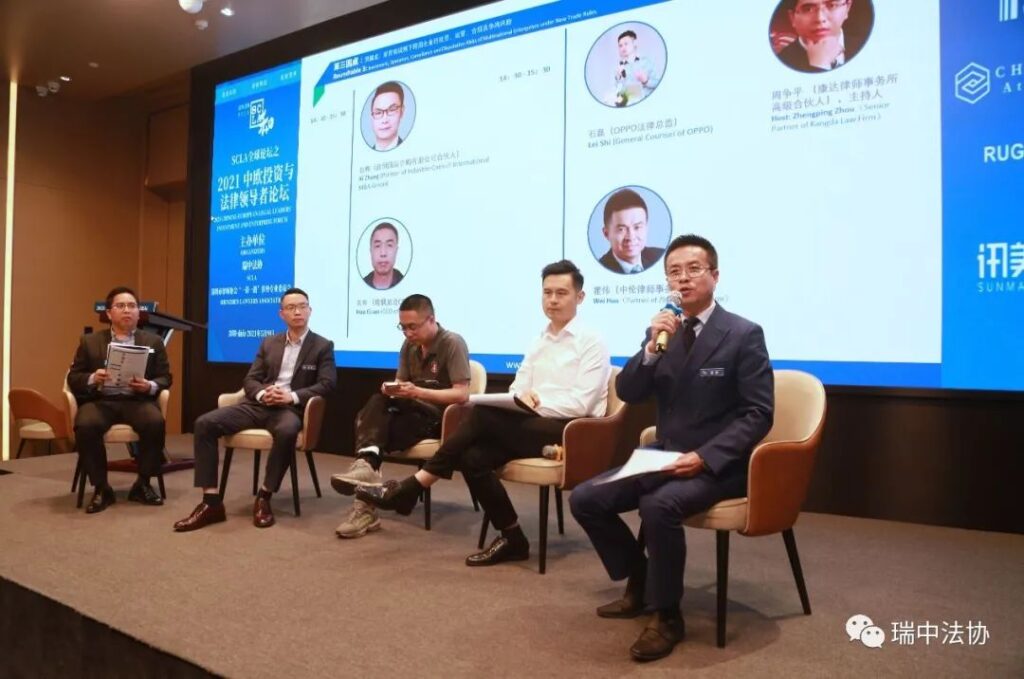
The China-EU Comprehensive Investment Agreement not only affects multinational enterprises’ investment, operation, compliance, and dispute risk management, the third roundtable of the forum: Investment, Operation, Compliance and Dispute Risk for Multinational Enterprises under the New Trade Rules was moderated by Zhou Zhengping, Senior Partner of Kangda Law Firm, with Zhang Xi, Partner of Inchuang International, Guan Hua, CEO of Xiaofeng Network, Shi Lei, Legal Director of OPPO, and Huo Wei, Partner of Zhonglun Law Firm, participating in the discussion.
According to Zhou Weiping, it has become a trend for Chinese companies to go abroad, and the rules of corporate cooperation are an important prerequisite for companies going abroad. Zhang Xi, Partner of Inchuang International M&A Co., Ltd., hopes that the legal profession can help the business community to invest in Europe based on the experience of the enterprises. According to Guan Hua, CEO of Xiaofeng Games, legal intervention is usually after a dispute occurs, and enterprises need the support of professional legal teams and professional lawyers before and during the process.
Shi Lei, legal director of OPPO, talked about the practical issues of risk control and compliance management faced by overseas investment from vivid cases. He also detailed the timeline of compliance development, examined the US compliance regulation situation faced by Chinese enterprises from the macro level, and put forward his opinions on how to do a good compliance job. Enterprises need to build a compliance system, put forward a compliance statement, develop a code of conduct and a series of compliance systems, and put the compliance system into practice through three aspects: process, organization, and culture. First, the compliance process should be integrated into the business through digital means; second, a compliance officer should be set up who is not a legal officer but a business officer; third, the corporate culture and compliance culture should be combined; without the recognition of compliance from the heart, the effectiveness of compliance can hardly be guaranteed. Finally, Huo Wei, Secretary-General of China Financial Investment Dispute Resolution Forum and partner of Zhonglun Law Firm, put forward effective and practical solutions and preventive suggestions for the legal difficulties encountered by enterprises from a professional perspective.
Roundtable 4: New Options for Transnational Dispute Resolution Mechanisms
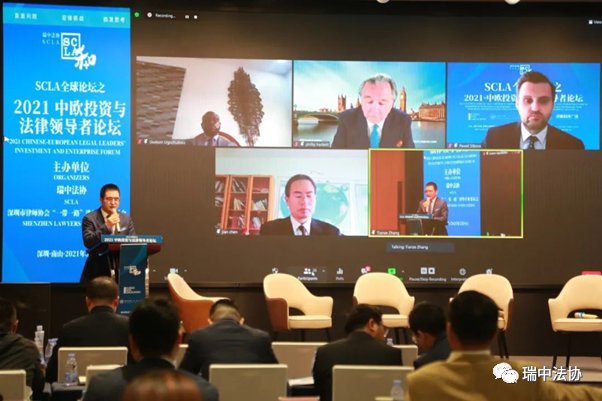
The fourth roundtable was chaired by Philip Hackett QC and featured Chen Jian, Executive Deputy Secretary-General of the China Arbitration Law Society; Godson Ugochuku, Arbitrator of the Chartered Institute of Arbitrators; Pavel Sikora, Partner of KG Law Firm, and Zhang Jian, Director of the Dacheng Law Firm (Shenzhen) office.
The fourth roundtable provides insight into the future of alternative dispute resolution mechanisms in the China-EU Comprehensive Investment Agreement. International mediation already has a relatively mature practice in international commercial dispute resolution, but international (including how mediation is conducted and its practice) varies worldwide. For example, in most cases, mediation in China is considered part of the pre-court process and is supervised and practiced by the courts. The roundtable analyzed how Chinese companies can protect their interests in overseas investment projects and prevent problems before they occur.
Pawel Sikora, a partner from the Polish law firm KKG, says what should be agreed upon in the contract to prevent the problem before it occurs? Internet arbitration and mediation under the New Crown Epidemic are very convenient for investors from China. Citing Poland as an example, he said that Chinese investors could choose a large institution and consider a relatively flexible and smaller dispute resolution center.
Godson Ugochukwu, a chartered arbitrator from Nigeria, said that international mediation is rooted in traditional African culture; mediation in Africa tends to think and solve problems from the perspective of overall social harmony, with the core of maintaining social stability and cohesion. In addition, the African mediation culture places great importance on factual truth and the construction of neutrality, which coincides with the world’s approach to and culture of mediation.
Chen Jian, Executive Deputy Secretary-General of the China Arbitration Law Research Association, argues from China that disputes in the China-EU Comprehensive Investment Agreement still need to be resolved in different countries and regions and by applying different legal systems. However, the agreement is still very enlightening for the dispute resolution mechanism of prevention. First, many new institutions have been established for dispute prevention, including the International Center for Dispute Prevention and Resolution (ICDR) set up by the CCPIT. Second, many Chinese arbitration institutions are gradually adapting to the new environment and new forms. Third, new forms of arbitration, including online arbitration and allowing (to some extent) non-institutional arbitration, in a benign market mechanism, are bound to further develop alternative dispute resolution mechanisms in China under a healthy market mechanism.
Zhang Jian, director of Dacheng Law Firm, believes that the role of Chinese lawyers in international mediation will grow, and Shenzhen’s role in international mediation is becoming more and more important. The investment agreements signed by different countries, such as China and the EU, have certain commonalities, such as mediation as an important means of dispute resolution. The trend of economic globalization and the development of the rule of law in global governance has also contributed to the modernization of dispute resolution.
Roundtable 5: Integrating Law and Business in the Digital Age
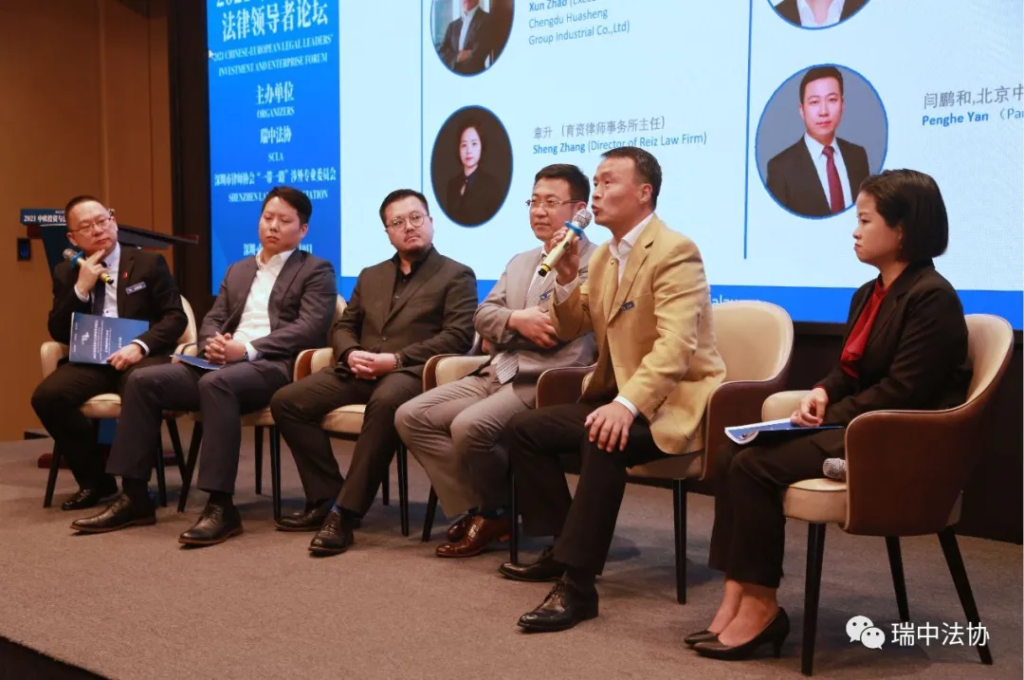
The fifth roundtable discussion of the forum was how to realize the integration of law and business in the digital era, hosted by Shang Congcong of Guohao (Ningbo) Law Firm. Zhao Xun, Executive Vice President of Chengdu Huasheng Group (Industry) Co., Ltd, Zhang Sheng, Director of Guangdong Yuzi Law Firm, Tang Heng, Managing Director of Smart Food Aloe, Xiao Wanhua, Director of Shanghai Oriental Cambridge Law Firm and Yan Penghe, Partner of Beijing BOC Law Firm participated in the roundtable discussion.
Zhao Xun believes that the new era and new environment require domestic lawyers to be better able to carry out international legal services worldwide. According to Tang Heng, in the digital era, the connection and development between law and business should be better promoted through, for example, electronic contracts. In addition, the use of early warning mechanisms of big data can better close the legal and commercial links.
According to Xiao Wanhua, as the supervisor of the enterprise, he should have a good sense of legal business, which has practical and economic value for the control and significance of the result. The value of a lawyer is to use the strategy to help the client solve the problem. As a lawyer, the most important thing is the strategy and execution of problem-solving. The digital age, too, offers possibilities for the younger generation.
Yan Penghe believes that lawyers should understand business models, have economic acumen, and think about legal issues from the perspective of enterprises. Lawyers should also consider the limits of legal-business integration, which also requires lawyers to have high professional conduct as well as professional ethics. Zhang Sheng analyzed the impact of legal-business convergence on personal data protection from the perspective of personal information protection law; therefore, a better focus on data compliance will protect enterprises.
In summary: Finding hope and a bright future amidst uncertainty
Finally, Chinese and foreign legal practitioners and scholars further discussed new options for transnational dispute resolution mechanisms in light of the China-EU Comprehensive Investment Agreement content. Yuan Peihao, an expert mediator from the China Council for the Promotion of International Trade Shenzhen Mediation Center, comprehensively reviewed and summarized representative commercial arbitration institutions and their advantages and disadvantages and concluded that the investment arbitration mechanism would remain an important way to resolve investment disputes in the foreseeable future.
Pan Lidong, director of Shenzhen Bar Association’s Belt and Road and Foreign-related Law Committee and managing partner of Guangdong Yuzi Law Firm, said that China had entered a new stage of development in recent years. With the signing of RCEP and the CAI agreement that may be signed shortly, more and more exchanges and dovetailing between the national judicial system and the international community. As a result, the lawyer team’s internationalization requirements are also increasing. The team of foreign lawyers needs to keep their sensitivity and hunger for new knowledge and strive to improve themselves so that they can fight for a greater voice for the country and the nation in the international arena and contribute to the great rejuvenation of the Chinese nation.
Pawel Sikora, the partner at Kubas Kos Garkowski (KKG), said that although there is uncertainty about the ratification of the China-EU Comprehensive Investment Agreement, there are also other possibilities for cooperation and that more efforts may be needed in the future to implement the agreement. Nevertheless, he believes it will have far-reaching value and significance for China-EU and China-US pairs. John Chigbu, founder of Chigbu & Co in San Francisco, California, USA, and Peter Ruggle, partner of Ruggle Partner, a Swiss law firm specializing in legal advice and dispute mediation for multinational companies, also expressed their optimistic outlook on the China-EU Comprehensive Investment Agreement (CIA) online. And his support for this forum.
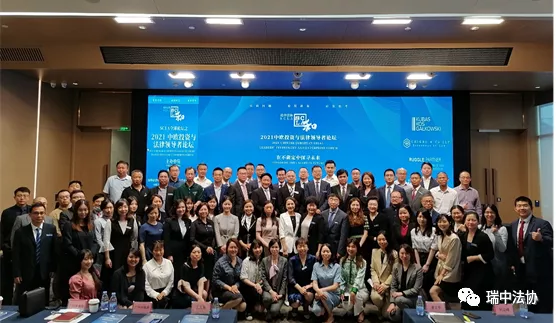
Event Organizers
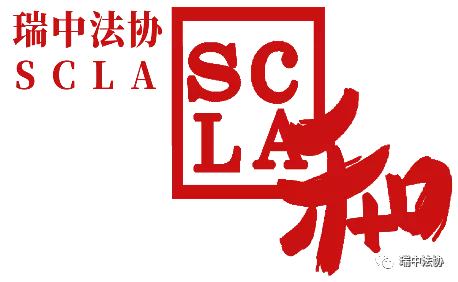
Swiss-Chinese Law Association SCLA
The Swiss-Chinese Law Association (SCLA) was founded in 2019 in Geneva, Switzerland, with the mission to promote professional exchanges on law and public policy and industry in different countries and regions, to promote cross-cultural understanding, to achieve professional cooperation among legal professionals worldwide, and to provide a lawyer’s voice in international rule-making. Furthermore, the Swiss-Chinese Law Association is committed to promoting an understanding between European and Asian countries of legal cultures and systems in different countries, which aims to create a more transparent, collaborative, and integrated legal world. The Association consists of more than 200 members from more than 18 countries/regions, with members coming from 4 main sectors: legal profession, judicial officials, an international group of professional professions, and academia.
“Belt and Road” and Foreign-related Law Committee
Shenzhen Lawyers Association is an industry self-regulatory organization established in accordance with the Lawyers Law of the People’s Republic of China and related laws, and is a social group legal person composed of all lawyers in Shenzhen, under the guidance and supervision of Shenzhen judicial, administrative organs and the guidance of higher-level lawyers’ associations, and implements the industry management of Shenzhen lawyers following the law. Shenzhen Law Association’s main purpose is to improve the quality of lawyers’ practice, protect the legitimate rights and interests of lawyers, and strengthen industry self-discipline. Its main responsibilities include formulating the development plan of the lawyer industry and lawyer practice norms, supporting lawyers to practice in accordance with the law; responsible for the education and supervision of lawyers’ professional ethics and practice discipline, carrying out the exchange and training activities of lawyers; coordinating the relationship between lawyers and legislative, judicial and administrative organs; promoting the work of lawyers and organizing the welfare of lawyers, etc. The “Belt and Road” Foreign-related Law Committee is one of the 30 professional committees under the Shenzhen Bar Association, dedicated to studying the legal issues related to the construction of “Belt and Road.” It promotes Shenzhen lawyers and Shenzhen legal services to take the initiative to “At the same time, it also increases the training of foreign-related legal service talents and strengthens the law firms.
Event Co-Sponsors
Kubas Kos Galkowski(KKG)

Kubas Kos Galkowski (KKG) is a global law firm founded in Poland with a reputation for global dispute resolution, named Dispute Resolution and Arbitration Law Firm of the Year (2019) Rzeczpospolita newspaper.
KKG specializes in the following areas: court and arbitration proceedings; group litigation; real estate law (including project financing); construction agreements; banking and metallurgy; corporate and commercial law; compliance; contract law; M&A transactions; antitrust law and bankruptcy law and corporate restructuring; political law and procedure; and energy law. KKG is the “Belt and Road” Lawyers Alliance law firm.
Ruggle Partner

Ruggle Partner is a leading Swiss law firm engaged in legal advice and dispute mediation for multinational companies, with offices in Zurich and Lucerne, Switzerland.
Ruggle Partner’s services are characterized by a constant focus on finding holistic solutions that accomplish the economic goals of its clients and protect their interests. Ruggle Partner is known for its creativity and commitment. Its goal is to find legally sustainable answers and the best business solutions.
SUNMAX TECHNOLOGY PARK

XUNMEI Technology Plaza locates in the Central District of Shenzhen High-tech Zone. It’s a large, intelligent, and modern comprehensive industrial park integrating headquarters office, technology R&D, financial business, talent exchange, business support, leisure, and entertainment under XUNMEI Technology Company. The park covers an area of 37,000 square meters, with a total construction area of 230,000 square meters and a total investment of about 1.9 billion yuan. The main building includes three high-rise R&D office buildings.
Special Thanks
Huaxia Zhicheng Management Consulting Co.
Guoyang Tobacco & Wine Co.
Strategic Partners
Guangzhou Arbitration Commission
Geneva International Mediation Center (GIDI)
International Intellectual Property Business Council (IIPCC)
Zhonglun Law Firm
Jintancheng Law Firm
Dacheng Law Offices
LEX AFRICA
China Federation of Aircraft
China Financial Investment Dispute Resolution Forum (CFFID)
Media Support
China Daily
Nanfang Daily
Phoenix.com
Wen Wei Po
Shenzhen Radio, Film and Television Group
Shenzhen Special Zone Newspaper
Shenzhen Jing Daily

